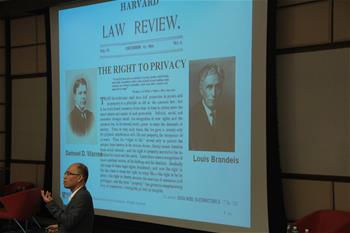
Leon Chia, Lecturer, Enterprise Social Business Practice, NUS-ISS
With the Do Not Call (DNC) Registry in effect since 1 January 2014, private individuals like you and me can grin a little smile of victory and relish the spam-free days.
The road to privacy has been difficult. And it has not ended. In fact, it'll get more complex. With greater privacy comes greater responsibility.
When Kodak released its first mass-market camera back in 1888, it very soon ignited a privacy furor as influential society balked at the loss of privacy. Kodak, surely in those days, must have faced some ire for their privacy-disrupting technology. It is thus a little ironic that come the 21st century, they themselves became victims of new disruptive technology, namely digital cameras and their kin. Kodak became bankrupt in 2012, though they returned in 2013, taking up enterprise digital printing and graphics. Change was, and is still necessary.
As for privacy today, it has become, at least in the public eye, the most popular fodder for social media. Not a year (or month) passes by without some protest being raised against social media for yet another privacy offence.
This is nothing new to you. The purpose of this article is not to point fingers at social media. The purpose is to see it the other way around. You see, social media - or for that matter, anything social, cannot function as a walled garden. If we all lived in total privacy, or total anonymity, social media would not work. Neither would friendships, partnerships and businesses.
Privacy has always been about give and take. We keep certain things private because it is reserved only for the eyes of those important to us. The argument of social media is that it offers value based on your individual needs. This is simply the inevitable requirement of a user-centric paradigm brought on by web 2.0. The system cannot offer relevant value to you without first identifying you, your likes and preferences. The DNC Registry cannot work if it didn't know your phone number.
What then? Should we give in to all the demands of social? No. One of the principal misconceptions about privacy in social media is that it is a give-all or give-none switch. It is not that simple.
Social media, ideally implemented, gives you a choice. You choose what to display, and what to hide. That's the game Facebook has been playing all these years, experimenting (with us as guinea pigs) with different ways of giving us control over different elements of privacy. Show this only to close friends; hide this from acquaintances; broad lists, granular photo privacy, and so on. Granted, it has been a difficult experiment, Facebook still hasn't perfected it and some have suffered its consequences, but at least they are trying.
Fundamentally, in the age of social, it is not that companies like Facebook should be responsible for our privacy settings, per se; we ourselves as individuals need to take up that responsibility. Facebook's role is to provide an effective tool for us to control our privacy. Its role is not to define for you or me what should be private. After all, as individuals we each have different needs and tolerances. Not everyone is an anonymity freak. Some people want attention from strangers, others want to keep it to a select privileged.
In an increasingly crowded and connected world, arguably, we can't afford to be totally "private". Our population is dense, our psychological spaces small; strangers stand next to you everyday; we even see strangers activities online, from your friends' friends. In such a world, we're better off knowing each other better, so that we can provide each other the relevant value. Without this social ecosystem, we will remain in silos.
This is the argument for social, not just in the world of social media, but also in terms of internal collaboration models, where a company of employees work better knowing each other's strengths and needs, instead of in department silos. In fact, it is precisely the onslaught of the social paradigm today that makes many companies still working in silo'ed environments uncomfortable - uncomfortable because they have privacy fears, or because the weaknesses of silos are increasingly evident. Or both.
Social technologies will continue to test and reshape boundaries of "social" and "private". We have to test them, break them, and help define what we want in the system. In the end, it is still about give and take. We have to give something of our past, in order to take something from the future.
This article is first published in NUS-ISS quarterly e-newsletter, Issue 5 (Jan-Mar 2014).